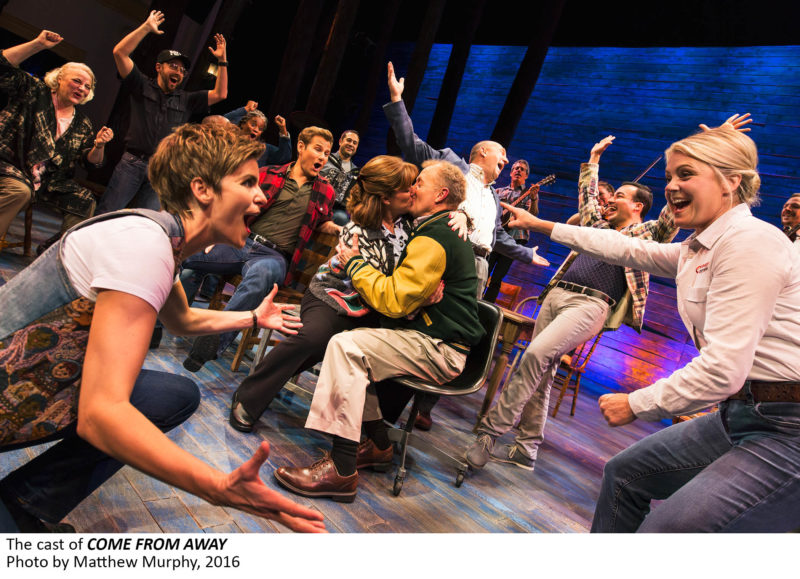Review by Sheldon Polonsky of “Come From Away”: Broadway in Cincinnati
Cincinnati’s Broadway Series begins its 2019-20 season with the timely, moving and critically acclaimed musical “Come From Away,” (book, music and lyrics by Irene Sankoff and David Hein) based on events surrounding the 9/11 terrorist attacks, when 38 planes and hundreds of travelers were diverted and stranded for several days in the small town of Gander, Newfoundland. The characters and stories (and even some of the names) come directly from interviews with the passengers and the Gander residents who welcomed and befriended them despite the unimaginably difficult circumstances.

“Come From Away” is entirely an ensemble piece with a cast of (incredibly) only 12 actors portraying dozens of characters–Canadian, American, and international–and their ability to shift between personas and dialects at a moment’s notice is dizzying (sometimes literally, as stories unfold on a turntable). The actors’ success in bringing these characters to life and differentiating them with only minimum costume cues was a truly monumental task. In addition, the set (designed by Beowulf Boritt) was eerily evocative despite being composed mainly of constantly shifting chairs and tables. Altogether this kaleidoscope required seamless timing and precision which the cast provided without missing a beat.
Because of its ensemble nature, it’s hard to single out many specific actors, but some memorable portrayals included Hannah (Danielle K. Thomas) whose ballad “I Am Here” reflects her agonized anxiety about the fate of her fire-fighting son; Beverley (Marika Aubrey), a female pilot whose moving number “Me and the Sky” ends with a heart-rending jolt; and Beulah (Julie Johnson), who serves as the emotional center of the Gander residents. Other “unsung” heroes include the band, who played in the background but got to showcase their talents more directly in the finale with their eclectic group of instruments including the unusual “Uilleann Pipes”, “Bodhran” and “Bouzouki”.
Now for the hard part of this review. Going in I had reservations–would this material be enough to hold a full Broadway musical? Would it do justice to our wrenching memories of 9/11? Unfortunately, for me, my reservations were not entirely put to rest. I could not help but compare “Come From Away” to two other ensemble Broadway musicals that brought together a group of strangers under stressful circumstances–“A Chorus Line” and “Titanic”. The former succeeded by intensely personalizing each character’s story; the latter failed to do so. For me, “Come From Away” seemed more like the latter, and I felt vaguely disconnected and distracted from the sheer number of stories and characters. I also could not help but feel awkward as we laughed at some of the quips or clapped at the bar-dancing as the natives initiated the “come from aways”, thinking about the torments of those left behind in New York.
But, assuredly, based on the enthusiastic response of the audience and its critical and box-office success, it’s fair to say that I am in the minority. And even my misgivings hardly undermined my enjoyment of the production and certainly not my estimation of its value and good-heartedness. Fundamentally, “Come From Away” is about the resiliency of the human spirit, our ability to transcend tragedy and find something to celebrate even in the bleakest of times. Perhaps we all need more of that today, as we did eighteen years ago on that tragic day.
“Come From Away” plays through September 29th at the Aronoff Center. Tickets can be obtained online at https://cincinnati.broadway.com.


